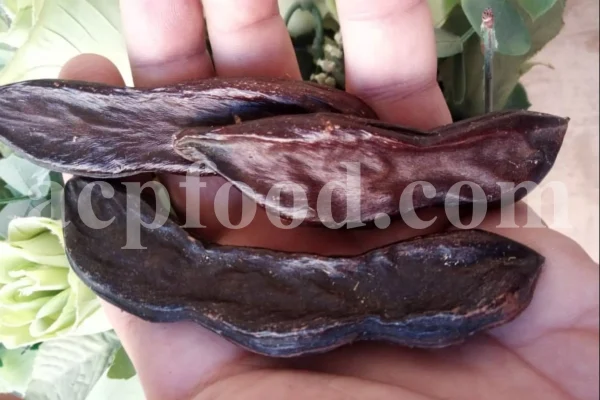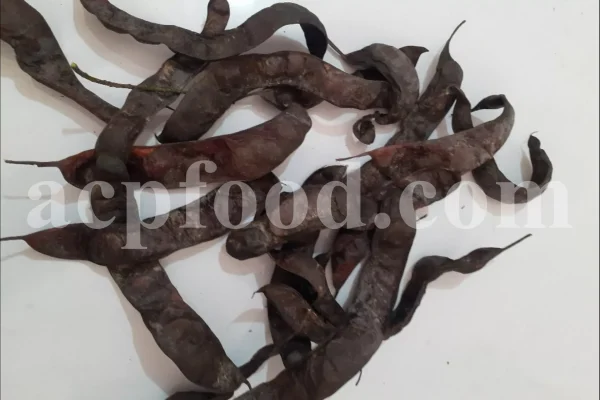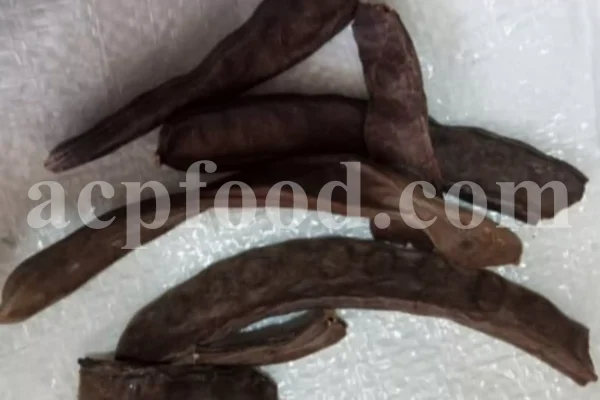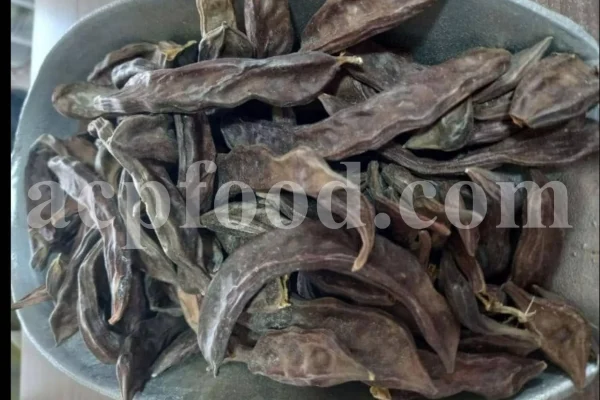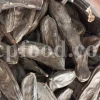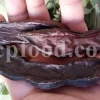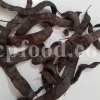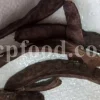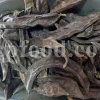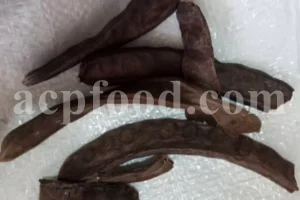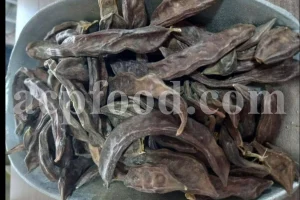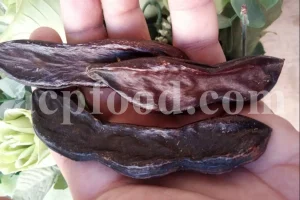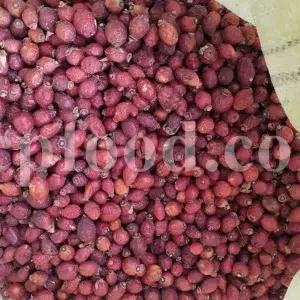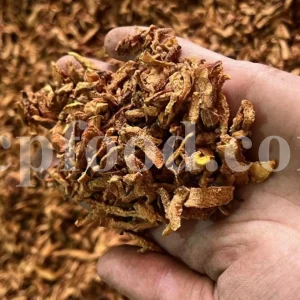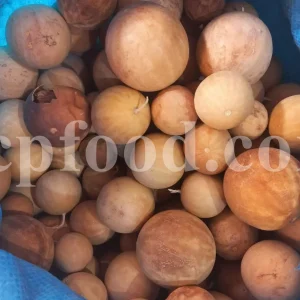GENERAL DATA
Plant parts: Fruits, Seeds
Cultivation mode: Wild collection
In manufacturing: Carob is in many skin care products and medications.
It’s usually labeled as C. siliqua, which is the scientific name for carob gum. The gum comes from the seeds, which are 35 percent gum.
Food manufacturers are replacing guar gum with carob gum as it displays similar properties.
Ceratonia siliqua gum is mainly used in cosmetics as:
An adhesive or binder.
A stabilizer for liquids.
A fragrance.
A texture enhancer.
In food: Locust Bean is used as a flavoring agent and as a chocolate substitute. Carob flour and extracts are also used as ingredients in food products.
Seeds and pulp are used as thickeners, stabilizers, and as natural sweeteners in the food industry.
The global Ceratonia siliqua market has also been segregated, based on application, into bakery and confectionery, dairy products, snacks, and others.
🌱 Industries That Use Carob Pods & Seeds (Ceratonia siliqua L.)
Here’s a comprehensive industry-focused breakdown for Carob, derived from the Ceratonia siliqua L. tree, a Mediterranean leguminous evergreen native to Southern Europe, North Africa, and the Middle East.
🌿 What Is Carob?
Carob is a nutrient-dense, naturally sweet fruit from the Ceratonia siliqua tree, consisting of long, dark brown pods enclosing hard seeds. Both pods and seeds are commercially valuable.
-
Pods are used as natural sweeteners and cacao alternatives
-
Seeds are processed to extract Locust Bean Gum (LBG)—a hydrocolloid used widely in food and cosmetic formulations
Carob is rich in polyphenols, insoluble fiber, galactomannans, and natural sugars, and is also caffeine-free, making it ideal for health-conscious consumers.
1. Food & Beverage Industry
Carob pods and seed derivatives are extensively used in the natural food and beverage sector as a substitute for chocolate and a source of dietary fiber and sweetness.
Pods:
-
Carob powder as a cocoa alternative in baking, energy bars, confectionery
-
Used in gluten-free and low-glycemic food products
-
Syrup (dibs) or molasses made from pod extract
-
Functional ingredients in caffeine-free beverages and smoothies
Seeds:
-
Processed into Locust Bean Gum (E410): a stabilizer, thickener, and emulsifier in:
-
Ice cream
-
Yogurt
-
Plant-based milk
-
Dressings and sauces
-
✅ Carob is GRAS (Generally Recognized As Safe) by the FDA
2. Nutraceutical & Health Supplement Industry
Carob is increasingly featured in functional food and natural supplement markets due to its prebiotic, antioxidant, and antidiarrheal properties.
Applications include:
-
Digestive health supplements (natural bulk-forming laxative)
-
Prebiotic fiber blends to support gut microbiota
-
Caffeine-free adaptogenic mixes for energy/snack bars
-
Natural remedy for mild diarrhea in children (tannin-rich pods)
✅ Common forms: powders, capsules, extracts, and functional nutrition bars
3. Pharmaceutical & Medical Formulations
Carob seed gum (LBG) and pod extracts are used in controlled drug release formulations and gastrointestinal medications.
Use cases include:
-
Tablet binding agent or excipient in drug delivery systems
-
Gastroprotective agent: slows gastric emptying
-
Oral rehydration therapies or suspensions
-
Supportive treatment in infantile diarrhea (non-toxic and hypoallergenic)
✅ Widely accepted in EU pharmacopoeia and food codices
4. Cosmetic & Personal Care Industry
Carob seed extracts and LBG are used in natural skincare for their hydrating, film-forming, and smoothing properties.
Applications:
-
Hydrogels and moisturizers for dry and sensitive skin
-
Hair conditioning products (adds texture and gloss)
-
Face masks and anti-aging creams
-
Used as a natural polymer in emulsions and gels
✅ Gentle, plant-derived alternative to synthetic thickeners
5. Animal Feed & Veterinary Industry
Carob pod meal is a palatable and nutritious feed additive in livestock, poultry, and even pet food formulations.
Benefits:
-
Rich in sugars, fiber, and minerals
-
Improves gut health in ruminants
-
Used in weaning diets for piglets
-
LBG used in pet food as a natural binder
✅ Non-GMO and environmentally friendly feed option
6. Ethnic, Organic & Export Markets
Carob is a valued product in Middle Eastern, Mediterranean, and North African cuisines, and it is gaining momentum in the global organic and vegan product sectors.
Exported as:
-
Raw dried pods
-
Carob powder or syrup
-
LBG (Locust Bean Gum) in bulk for industry use
-
Premium tea blends and health mixes
✅ Popular in ethnic markets, health food stores, and specialty ingredient suppliers
7. Academic & Scientific Research
Research on Carob focuses on:
-
Antioxidant and antidiabetic effects
-
Use of LBG in biofilm formation and drug delivery
-
Nutritional impact of carob fiber and polyphenols
-
Food engineering studies on viscosity, gelling, and stabilizing capacity
✅ Prominent in food science, pharmacognosy, and material engineering studies
✅ Summary of Key Applications
| Industry | Common Uses |
|---|---|
| Food & Beverage | Cocoa substitute, carob syrup, stabilizer (LBG) in dairy/vegan products |
| Nutraceutical & Health | Digestive aids, prebiotics, anti-diarrheal supplements |
| Pharmaceutical | Binder, gastroprotective, infant formulas |
| Cosmetic & Personal Care | Hydrogels, hair conditioners, natural emulsifiers |
| Animal Feed | Pod meal in livestock feed, LBG in pet food |
| Ethnic & Export Markets | Whole pods, powder, LBG exports |
| Scientific Research | Drug delivery, antioxidant studies, gelling agent development |
🌟 Key Features
-
Caffeine-free and naturally sweet
-
High in galactomannan (LBG), polyphenols, and dietary fiber
-
Safe, hypoallergenic, and suitable for infants
-
Valued in food, pharma, cosmetic, and veterinary sectors
-
Approved in EU, USA, and Middle East markets
PRODUCT NAME IN DIFFERENT LANGUAGES
Persian Name: خرنوب، خروب/ Kharnoub, Kharoub
German Name (Deutschland, Austria, Switzerland): Johannisbrotbraum, Karobenbaum, Karube
French Name (France, Belgium, Switzerland, Quebec): Caroubier, Caroube
HARVEST CALENDAR
Feb
Mar
Apr
May
Jun
Jul
Aug
Sep
Oct
Nov
Dec
About Ceratonia Siliqua
It is a plant of the Leguminosae family, a beautiful tree 7 to 12 meters tall, which leaves are compound, consisting of 8 to 10 pairs of reddish-green leaflets, shiny, thick and leather like. The circumference of the trunk of this tree reaches 2 meters. The flowers are petal less, clustered, red or amethystine.
The fruit of Ceratonia siliqua is a long, curved, fleshy pod 10 to 30 cm long, the fruit has a very sweet taste similar to honey, and inside the pod there are 12 to 16 hard seeds similar to lentils. This tree is native to the Mediterranean region and grows wild in Syria, Chamat and Anatolian desert. In Iran it grows only in Fars province near Kazerun.
Ceratonia Siliqua Chemical Constituents
Fruit: about 60% Carbohydrates, 33% Sucrose, 18% Glucose, Tannin and other materials. Vitamins: A, B and D.
Seeds: Fatty oil, resin included Mannose and Galactose.
To order Carob Beans in bulk, please contact us.
Locust Bean Temperament
Cold and dry
Locust Bean Health Benefits
Carob pod:
- It is a diuretic, cures chest diseases, strengthens the stomach, is beneficial for weight gain and also stops diarrhea.
- Eat 30 to 50 centigram of fruit peel. It is useful for relieving diarrhea and stop coughing.
- Mix Locust Bean pods with milk and drink. It is appetizing and beneficial for relieving cough.
- Rub its fresh extract on the warts. It will eliminate them.
- Pulverize St. John’s Bread pods gently and mix it with Henna, then knead it and cover your head with it. It prevents hair from greying.
Locust Bean Side Effects
Ceratonia Siliqua pods is slow to digest and flatulent, especially its fresh fruit, which has been picked less than one year ago.
Carob Seeds:
- Pulverize and eat it. It is very astringent, it is useful to prevent bleeding.
- Pulverize St. John’s Bread seeds and eat them. It is used both as a laxative and as an astringent.
- Stick it on the wart and it will remove the wart.
To order Carob Locust bean in bulk, please contact us.


